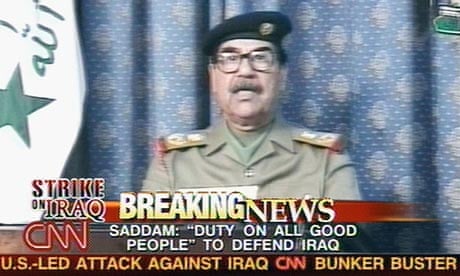Reality finally came to Baghdad yesterday. Overnight, sandbags sprouted on football fields and roundabouts. In the evening the authorities rustled up yet another peace demonstration.
The number of fatal car accidents seemed to surge, with drivers in a panic to get home, or to get out. Chemists sold out of valium. Queues at petrol stations broadened and lengthened in a country where fuel is ridiculously cheap and plentiful. The price of mineral water doubled. Tinned foods and packaged soups disappeared from supermarket shelves. Young couples rushed to get engaged. Workers stored the files and fixtures from Iraqi government office buildings.
Although Iraqis have talked of little else but war since last September - when it would break out, how long it would last, would their soldiers fight or flee, would Saddam Hussein let his grandchildren be slaughtered in a final stand - it never seemed entirely real.
Until yesterday morning, that is, when news spread of President George Bush's speech to the Americans.
After months of waiting and worry the prospect of imminent attack was here, all too suddenly, and horribly real.
In the kitchen of the Abdel Hamid family you could see it had arrived. A young boy, Amr, was making his own final preparations for the onslaught. He was performing the last rites of a four-year-old. In his hand he brandished a plastic gun. Whacking the ammunition clip into the toy, he held it to his stomach and put on a fierce expression. Then he raised it to the heads of the surrounding adults. "Where are my bullets?" he screamed.
Baghdadis have lived with the threat so long now that they have become used to burying their fears. One technique is to recount their survival stories of other US and British bombardments: in 1991, after Iraq's invasion of Kuwait, in 1993, and again in 1998.
But by yesterday morning, as President Bush made plain, less than 48 hours remained, and it was becoming impossible to hang on to those earlier delusions.
Even the weapons inspectors were now all making their getaway.
On the runway of Saddam airport, an old soldier in an elegant dark suit and red tie shepherded the weapons experts and remaining UN staff on to a dilapidated green and white Iraqi Airways bus and towards the aircraft waiting to take them to Cyprus.
At 10am a vehicle pulled up to the side of the building. "All loaded up," the driver said.
Geoffrey Beaumont, the deputy director of the inspectors, was outwardly calm. "People are sad because they have put their hearts and souls and blood and tears into this. They worked bloody hard, and let's face it, no one wants war."
In neighbourhoods like Amr's all over Baghdad, they are dreading the next few days. People are exhausted before it has even begun.
Amr's mother, Myasaa Abdel Hamid, is four months' pregnant and bone tired. "I've started talking to him about the war during these last few days," she said. "I told him, 'If you hear loud noises outside the house, don't worry, they aren't coming in.'
"But he doesn't really get it. He wants to know why there is going to be a war. He wants to know what Bush looks like. He wants to know if Bush is very angry with us. He wants to know if Bush has planes and guns.
"I tell him, 'Bush has everything'."
As the weapons inspectors went through their departure formalities, Myasaa used the morning for her own, grown-up's last rites.
She put a web of masking tape over the kitchen window in the hope of stopping the glass being shattered by the vibrations of nearby bombs, and piled mattresses and pillows in a ground-floor room, which is seen as a safer sleeping quarters than the first floor.
A nephew arrived with cartons of fruit juice to add to the supplies stored in an outdoor shed.
The neighbours revved up their generator for a test run, and Myasaa pumped an exploratory trickle out of the tube well recently dug at her doorstep.
The only thing left for her to do now is cry when the bombs start dropping, she said.

Comments (…)
Sign in or create your Guardian account to join the discussion